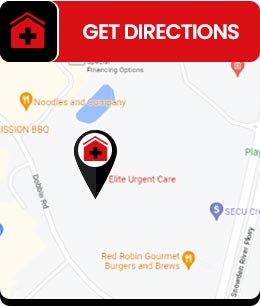Basic Information Regarding Insect Bites and Stings in Columbia MD
The majority of bites elicit moderate stinging or irritation. Certain bites might cause a life-threatening allergic reaction that necessitates immediate medical attention. Respiratory problems, facial swelling, fainting, confusion, and hives are all indications of an allergic response. For more information, contact us or request an appointment online. We are conveniently located at 6100 Dobbin Rd, Suite A Columbia, MD 21045.


Table of Contents:
What should we do if we are stung by the stinger?
What are the symptoms of severe allergic reaction post-sting?
The Normal reaction to an insect sting and its management:
What should we know about Insect bites?
Clinical presentation of insect bite:
Treatment of insect bite:
It is summertime, and we may experience insect bites or stings. Here is some basic information that may help you and give you a better insight regarding how you should manage these issues by the time you see your healthcare provider.
How is the bite different from the sting? An insect bite is done by the mouth part and can transfer blood from a human or insect to a human, and transmit disease, whereas a sting is usually done by the stinger part and will not carry disease. Insect stings like those from wasps, bees, or ants usually do not transfer disease, but venom injections cause irritation and pain at the site, and can cause a severe allergic reaction and even death in some cases. We can see the inflammatory reaction and secondary infection post-sting or bite as well.
We should remove the stinger from the skin. If any symptoms of a severe allergic reaction, we should call 911 ASAP.
• Have trouble with breathing, the voice becomes hoarse, and start wheezing
• Swelling of face, around the eyes, ears, tong, hands, and feet
• Feeling dizzy and passing out
• Developing diarrhea, nausea, vomiting, and belly cramp.
Usually, you will develop pain, redness, swelling, and itching at the site of the sting. You should wash the area with soap and water. Then apply a cold compress, and anti-itching creams or solutions. If the pain is severe, you should take nonprescription pain medication if needed.
• What should we do to reduce the chance of getting bitten or stung?
• Wear long-sleeved shirts, pants, and shoes when you go outside
• Wear bug spray
• Keep food and drink covered when you go outside
• Stay inside down and dusk when are more insects outside, and they are more active and moving.
• If you see a stinging insect, stay calm and back away slowly
An insect bite can cause minor symptoms or may lead to serious medical issues like the transmission of insect-borne disease, or a severe allergic reaction. The most common arthropods that can bite humans are mosquitoes, ticks, bed bugs, deer flies and horse flies, black flies, sand flies, fleas, chiggers, fleas, lice and etc.
It can be localized redness and itching, a large local reaction, or sometimes a delayed local reaction. It may present with an inflammatory reaction secondary to the bite and insect saliva. It may present with systemic reaction and transmission of disease which could be serious and with a variety of clinical presentations.
Localized reaction:
Washing lesions with soap and water, using a cool compress, using anti-itching creams like Calamine, and observation is recommended. If a severe reaction using an antihistamine like Benadryl locally, or an oral antihistamine like Cetrizine is recommended, and follow up with your health care provider.
Unusual localized reaction:
An unusual localized reaction like blisters, or local skin necrosis, should be evaluated by your health care provider, and treatment includes but is not limited to antihistamine, topical corticosteroid cream, and observation.
Severe allergic reaction due to insect bite:
In case of severe allergic reaction which we discussed the symptoms earlier, you must call 911, or go to your nearest Hospital ER for emergent management.
References:
• Update
• Medscape
• Mayo Clinic
Check Out Our 5 Star Reviews









